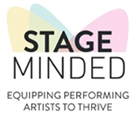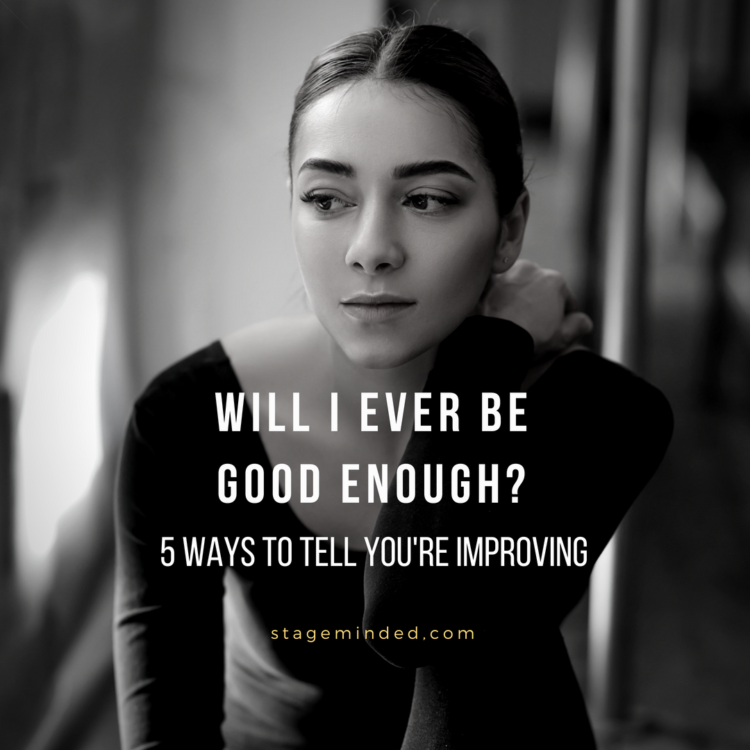Will I Ever Be Good Enough? 5 Ways to Tell You’re Improving
“There will be times when standing alone feels too hard, too scary, and we’ll doubt our ability to make our way through the uncertainty. Someone, somewhere, will say, ‘Don’t do it. You don’t have what it takes to survive the wilderness.’ This is when you reach deep into your wild heart and remind yourself, ‘I am the wilderness.’”
– Brené Brown (Braving the Wilderness)
—
Do you sometimes feel overwhelmed, like you’re running on a treadmill but not getting anywhere? The challenges you face in the performance world may seem relentless as the bar continues to be raised, and the expectations keep going up.
When you tune into your thoughts do you find yourself calling out into the wild?
“Will I ever be good enough?!”
The truth is, you already have what it takes, you just might not realise it yet. Performers like you, often achieve heaps, yet still feel they aren’t capable.
In Psychology, we call this having a lack of ‘self-efficacy’.
Self-efficacy is about believing in your own ability. It’s having a sense of assurance that you can perform the things you set out to and cope well with any challenges that may come up.
Without a strong sense of self-efficacy as a performer, you’ll continually doubt yourself and be looking outwards to find out if you have what it takes.
This means you measure your ability through people and situations like:
- competitions won
- exam results
- roles you get cast in
- how you compare to others
- praise from people who are important to you
…rather than how you’re actually doing on the inside, which is a more accurate way to measure your progress.
While these examples of external measures have their place in motivating you as an artist, the problem with relying on them is, they are things outside of your control, which leaves your confidence in someone else’s hands.
If you can take the blinders off and begin to develop some of your own ways of measuring your improvement, you’ll find your self-efficacy improving too. Gathering this as “evidence” gives you confidence and propels you to believe you can achieve even more.
Here are 5 ways to measure your progress and take back control of your own confidence:
Free Checklist: Download our 5-Step Self-Efficacy Checklist to measure your progress and build your confidence (with an extra factor not included in this post)
1. Effort and persistence
In order to accurately measure your progress, try asking yourself:
- Am I putting in the effort?
- Am I putting in consistent effort that will enable me to see results?
If you’re actively working towards achieving your goals, you can give yourself credit for your effort and experience a sense of achievement.
So, if you’re working on your goal to project more on stage, and your teacher says to you, “you’re not projecting enough”, you don’t need to default to believing you’re incapable and not good enough. You can come back to your effort, and remind yourself:
“Hang on, I know that I am actively putting in consistent effort to improve my projection. I have already seen some improvements in it”.
Keep going! Your effort is a measure of your self-efficacy.
2. Applying learning strategies correctly
This is about recognising your own process of learning and growing as an artist. If you understand which strategies will help you improve and apply those correctly, that’s a sign of your capability.
Doing your strengthening exercises, managing your nerves, applying a teacher’s correction… These are all tools you can use to help you improve now, and set you up to improve in the future.
You might not win every competition, but you can always measure the ways you have succeeded in applying learning strategies in your performance.
3. Your developing ability
A lot of performing artists talk about other artists who have great “facility” and “ability” as if they are static, unchangeable things, but as we know with a Growth Mindset, they are not.
There is actually a lot you can control and change about your ability.
If you think your ability is static, you will limit your chance to succeed because you can all too easily say,
“I can’t do that, I’m not good enough, flexible enough, fast enough…”
But if you see your ability as something malleable, more like a raw material you can develop and make something out of, you may just surprise yourself with a sense of growing satisfaction.
Even though you might not be able to perform the way you ultimately hope to yet, by measuring the markers of your improvement, you can build your confidence that your ability is developing, and experience success along the way.
“Strive for progress, not perfection”
4. Your performance skills
Another thing that boosts your sense of self-efficacy is acknowledging your performance skills and the things that you already do well.
A lot of the time performers focus only on the things they can’t yet do and take for granted all the things they can.
Take a moment to make a list of all the skills pertaining to your art-form that you already have. When you get frustrated with the limits of your current ability, this will help remind yourself of what you can do.
Give yourself some credit for all the things that make you successful today.
5. Your ability to cope with challenges.
Even hard times, failures and challenges can be fertile soil for growing confidence in your ability. Acknowledge the challenges you’ve overcome, and apply the skills and understanding you’ve learnt from these experiences.
Ask yourself:
“What have I been through in the past that will help me believe I can cope with a challenge I’m facing right now?”
So, when you’re next in a challenging performing environment you can securely say to yourself:
“I can do this. I have coped with XYZ in the past. I’ll find a way to make this work”.
Developing self-efficacy is kind of like taking the scenic road in a world that makes us believe we need instant gratification. Not only will you notice your growing capabilities, when you stop out-sourcing your confidence, you’ll actually feel a greater sense of worthiness.
“We can’t ask people to give to us something that we do not believe we’re worthy of receiving. And you will know you’re worthy of receiving it when you trust yourself above everyone else.”
– Brené Brown
Here’s to believing in you!
🙂 Philippa


